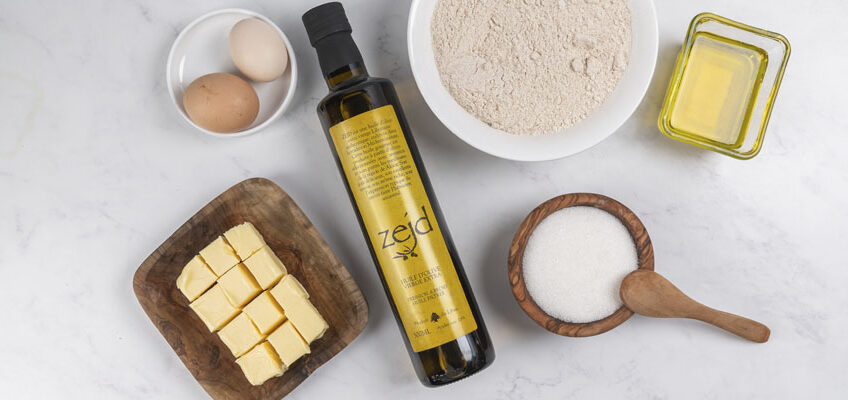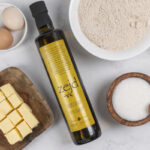Extra virgin olive oil (EVOO) and butter, are two essential staples in every kitchen, that serve as popular cooking fats, commonly used interchangeably based on convenience or taste preferences; whereas there are more considerations at play, due to their different natures and distinct characteristics.
Understanding the differences
– Source: EVOO is from plant origin, derived from cold-extraction of natural olives juice; while butter is from animal origin, made from churned cream.
– Flavor: EVOO has a distinct fresh and robust flavor, often fruity or peppery, that adds complexity to dishes; while butter has a rich, creamy flavor with a slightly sweet and sometimes
nutty taste, that enhances the taste of many dishes.
– Nutritional Composition: key components per one tablespoon (approximately 14 grams):
- Caloric content: EVOO has 119 calories per tablespoon; while butter has 102 calories per tablespoon.
- EVOO has a total fat of 14 grams, including 2 grams of saturated fat, 11.5 grams of unsaturated fat, and 0 mg of cholesterol; while butter has a total fat of 12 grams, including 7 grams of saturated fat, 3.5 grams of unsaturated fat, and 31 mg of cholesterol.
- Vitamins: EVOO contains Vitamin E and K; while butter contains Vitamins A, E, and K2.
– Health Aspects: EVOO is rich in monounsaturated fats, antioxidants, and anti-inflammatory properties; It is associated with various health benefits, including reduced risk of heart disease and chronic diseases. Butter, on the other hand, contains saturated fats and cholesterol, which can contribute to an increased risk of heart disease if consumed in excess; but it also provides essential fat-soluble vitamins like A, that promotes vision and immune function, D, E, an antioxidant, and K2, that promotes bone and cardiovascular health; moderation is key due to its saturated fat content.
– Smoke Point: EVOO’s smoking point is generally around 190-207°C, making it suitable for most cooking methods, including sautéing and frying; Butter has a lower smoke point, around 150-175°C due to its milk solids, making it less suitable for high-heat cooking, but great for low to medium-heat applications.
– Dietary Preferences: EVOO offers a wider dietary flexibility over butter, particularly for those who are vegan, lactose intolerant, or have dairy allergies.
– Uses: EVOO is ideal for salad dressings, marinades, drizzling over dishes, sautéing, roasting, frying, grilling, and even baking where a pronounced flavor is desired; it is also particularly suited for Mediterranean cuisine. Butter, on the other hand, is great for baking where it helps with texture and flavor, sautéing at low to medium heat, making sauces like hollandaise béchamel, and adding richness to dishes like mashed potatoes or scrambled eggs.
Choosing between EVOO and butter often depends on dietary preferences, cooking needs, including desired flavor, and health goals. For overall health and nutrition, EVOO is typically the better choice. However, butter can be used sparingly for its unique flavor and richness in specific culinary applications.







Leave a Reply